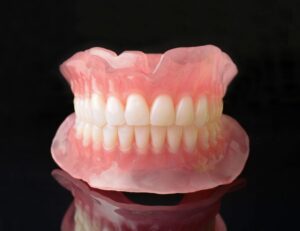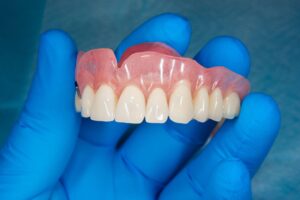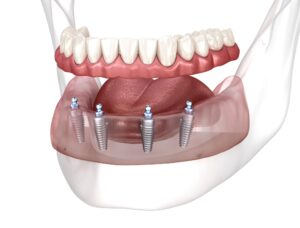Complete Dentures: A Comprehensive Guide to a Perfect Smile
Best dental clinic in Hyderabad for Complete dentures
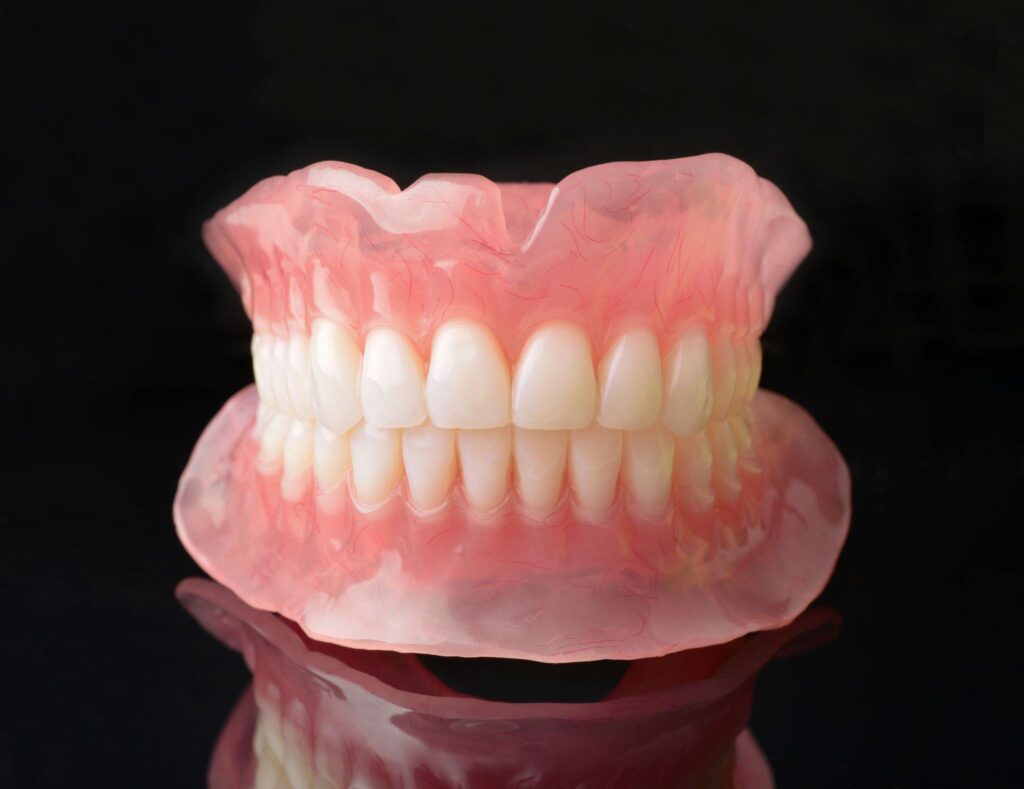
Introduction
Complete dentures a significant solution for individuals seeking to regain their confidence and restore their smile. With a rich history and continuous evolution, complete dentures have become more advanced and natural-looking over time.
Understanding the significance of complete dentures
Complete dentures play a crucial role in restoring oral function and aesthetics for individuals who have lost all of their natural teeth. They provide support to facial muscles, enabling individuals to maintain their facial structure and prevent sagging.
Brief history and evolution of complete dentures
The history of complete dentures dates back to ancient civilizations, with various materials and techniques used throughout the years. From animal teeth to porcelain, the evolution of complete dentures has witnessed significant advancements in both comfort and aesthetics.
Types of Complete Dentures
Conventional Dentures
Conventional dentures are the traditional type that requires a meticulous fabrication process and timeline.
Fabrication process and timeline
- The process begins with impressions and measurements of the patient’s mouth, ensuring a precise fit.
- These measurements are then used to create trial dentures, which are evaluated for fit, comfort, and aesthetics.
- Adjustments are made as necessary to ensure the perfect fit.
- Finally, the dentures are fabricated and delivered to the patient.
Immediate Dentures
Immediate dentures offer advantages in terms of immediate teeth replacement, although they come with limitations.
Advantages and limitations
- Immediate dentures provide immediate restoration of teeth, ensuring individuals don’t have to go without teeth during the fabrication process.
- However, due to the accelerated timeline, adjustments may be necessary during the initial phase of wearing immediate dentures.
Preparing for immediate dentures
- The patient’s mouth is prepared by extracting any remaining teeth, if necessary.
- Impressions are taken to create immediate dentures that can be worn immediately after extractions.
Immediate denture adjustment phase
- As the gums heal and shrink, adjustments are made to maintain a proper fit.
- Patients should expect several adjustments during this phase to ensure optimal comfort and function.
Transitioning to permanent dentures
- After the healing process is complete, permanent dentures are fabricated based on the healed gums’ measurements.
- The immediate dentures are typically used as a spare set or kept as a backup.
Materials Used in Complete Dentures
Different materials are used in the fabrication of complete dentures, each with their own unique properties and benefits.
Acrylic Dentures
Acrylic dentures are commonly used due to their versatility and durability.
Properties and benefits
- Acrylic dentures are lightweight and comfortable to wear.
- They are durable and resistant to fractures, making them suitable for long-term use.
Fabrication process
- The acrylic denture base is created using a heat-cured or cold-cured technique, depending on the specific requirements of the patient.
- The teeth are then individually selected and positioned to create a natural-looking smile.
Maintenance and care tips
- Acrylic dentures should be cleaned daily with a non-abrasive denture cleanser.
- Regular check-ups with a dentist are essential to ensure proper fit and function.
Porcelain Dentures
Porcelain dentures offer a more natural appearance but require careful handling.
Distinct features and advantages
- Porcelain dentures closely resemble the appearance of natural teeth, providing a highly aesthetic option for individuals seeking a more realistic smile.
- They offer superior stain resistance compared to other materials.
Fabrication process
- Porcelain dentures are created using a technique where porcelain is fused to a metal framework.
- This technique allows for a strong and durable denture that mimics the characteristics of natural teeth.
Considerations for porcelain dentures
- Due to the fragile nature of porcelain, efforts should be made to avoid dropping or damaging them.
- Regular maintenance and professional cleanings are necessary to ensure longevity and prevent damage.
Flexible Dentures
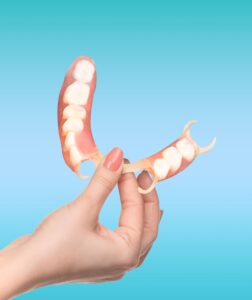
Flexible dentures provide added comfort and reduced irritation.
Exploring the flexibility advantage
- Flexible dentures are made using a more pliable acrylic material, offering a customized and comfortable fit.
- They distribute biting forces more evenly, reducing pressure on the gums.
Fabrication and adjustment process
- Fabrication of flexible dentures involves the use of a flexible base material that adapts to the shape of the gums.
- Adjustments can be made easily during the fitting process to enhance comfort and aesthetics.
Comparing with acrylic and porcelain dentures
- Flexible dentures provide increased flexibility and stability compared to acrylic dentures.
- However, they may not be as aesthetically pleasing as porcelain dentures.
Implant-Supported Complete Denture
Implant-supported dentures offer a more stable and secure solution for individuals with missing teeth.
A. Understanding implant-supported dentures
- Implant-supported dentures are secured in place by dental implants that are surgically placed into the jawbone.
- They provide enhanced stability, allowing individuals to eat and speak with confidence.
B. Benefits of implant-supported dentures
- The implants in implant-supported dentures prevent bone loss by stimulating the jawbone, preserving facial structure.
- These dentures eliminate the need for denture adhesives and provide a more natural feel while eating or speaking.
C. Surgical procedure and recovery
- The process of getting implant-supported dentures involves a surgical procedure and a recovery period.
- The implants require time to integrate with the jawbone before the denture can be attached.
Adjusting to Complete Dentures
Adjusting to complete dentures can be a gradual process, but with time, it becomes easier to eat, speak, and smile confidently.
A. Initial discomfort and adaptation period
- It is common to experience some discomfort during the initial phase of wearing complete dentures.
- However, the mouth gradually adapts to the prosthetic, and any discomfort usually diminishes over time.
B. Eating, speaking, and smiling confidently
- Initially, eating and speaking may require some adjustments. It’s best to start with soft foods and practice speaking to regain full confidence.
- As the muscles and oral tissues adapt, these activities become easier, allowing individuals to eat, speak, and smile confidently.
C. Oral hygiene techniques for denture wearers
- Proper cleaning of dentures is crucial for maintaining good oral health. Dentures should be removed and cleaned daily with specialized denture cleaners.
- Additionally, it is important to maintain regular oral hygiene practices for the remaining natural teeth and gums.
- Common Denture Problems and Solutions
- Even with proper care, some common problems may arise while wearing dentures. Fortunately, there are solutions available.
Common Denture Problems and Solutions
A. Sore spots and pressure points
- Sore spots and pressure points can develop due to denture irritation. These can be addressed by denture adjustments or relining.
B. Loose dentures and adhesion issues
- Loose dentures can cause discomfort and affect oral function. Denture adhesive can be utilized to improve retention.
- If dentures continue to be loose, it may be necessary to have them professionally adjusted or relined.
C. Speech difficulties and lisping
- Adjusting to speaking with dentures may initially cause speech difficulties and lisping. Regular practice and speaking exercises can help overcome these challenges.
D. Dealing with denture odour
- Denture odour can occur due to inadequate cleaning. Regular cleaning with denture cleaners and soaking in a denture cleanser can effectively eliminate odour.
E. Professional adjustments and relining options
- Denture wearers should schedule regular check-ups with their dentists to evaluate the fit and function of their dentures.
- Professional adjustments and relining can address any loosening or discomfort experienced.
Long-Term Denture Care
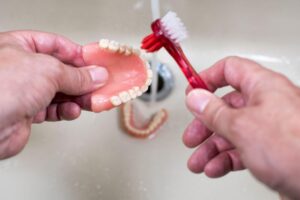
Proper care and maintenance are crucial for extending the longevity of dentures and ensuring oral health.
A. Tips for maintaining denture longevity
- Handle dentures with care to avoid dropping or damaging them.
- Avoid using abrasive materials or harsh chemicals for cleaning, as they can damage the denture.
B. Proper cleaning routines and products
- Dentures should be cleaned daily using a non-abrasive denture cleanser and a soft-bristled brush.
- Dentures should be soaked in a denture cleanser solution overnight, following the manufacturer’s instructions.
C. Identifying signs for denture replacement
- Over time, dentures may become worn, lose their fit, or become discoloured.
- Signs such as cracks, chips, or difficulty chewing indicate the need for replacement.
Alternatives to Complete Dentures
Although complete dentures provide an effective solution for tooth loss, alternatives are available for individuals seeking different options.
A. Partial dentures: An overview
- Partial dentures are used when only some teeth are missing. They are designed to fill in the gaps between natural teeth.
B. Bridges and dental implants: A comparison
- Bridges and dental implants offer more fixed alternatives to complete dentures.
- Bridges use adjacent teeth as support, while dental implants are surgically placed in the jawbone to support prosthetics.
C. The role of denture specialists in exploring alternatives
- Denture specialists can evaluate individual needs and recommend the most suitable options based on the patient’s specific requirements.
Overcoming Challenges with Complete Dentures
Wearing dentures involves more than just physical adjustments, but also psychological aspects and changes in one’s facial aesthetics.
A. Psychological aspects of wearing dentures
Adjusting to the appearance and feel of dentures can have psychological impacts, such as lowered self-esteem or anxiety.
With time, individuals can regain their confidence and adapt to the change.
B. Coping with changes in facial aesthetics
Facial changes caused by tooth loss can initially be challenging to accept. However, the restoration of a natural-looking smile can boost self-esteem and improve facial aesthetics.
C. Seeking support and joining denture wearer communities
Joining denture wearer communities or seeking support from friends and family can provide reassurance and valuable advice during the adjustment period.
FAQs about Complete Dentures
A. Can anyone get complete dentures?
Yes, complete dentures are a viable option for individuals who have lost all their natural teeth.
B. How long do dentures typically last?
The lifespan of dentures varies depending on factors such as maintenance, wear and tear, and changes in oral health. On average, dentures last about 5 to 10 years.
C. Are there any dietary restrictions with dentures?
While there are no specific dietary restrictions, it’s advisable to start with softer foods initially and gradually introduce harder or sticky foods.
D. Can dentures improve one’s appearance?
Yes, dentures can significantly improve one’s appearance by restoring a natural-looking smile and supporting facial structure.
E. What are the costs associated with complete dentures?
The cost of complete dentures varies depending on factors such as the materials used, the complexity of the case, and additional treatments required.
Conclusion
Complete dentures offer a comprehensive solution for individuals who have lost their natural teeth. From improved aesthetics to enhanced oral function, complete dentures provide numerous benefits. By embracing a confident smile, individuals can regain their self-esteem and enjoy a perfect smile for years to come.

